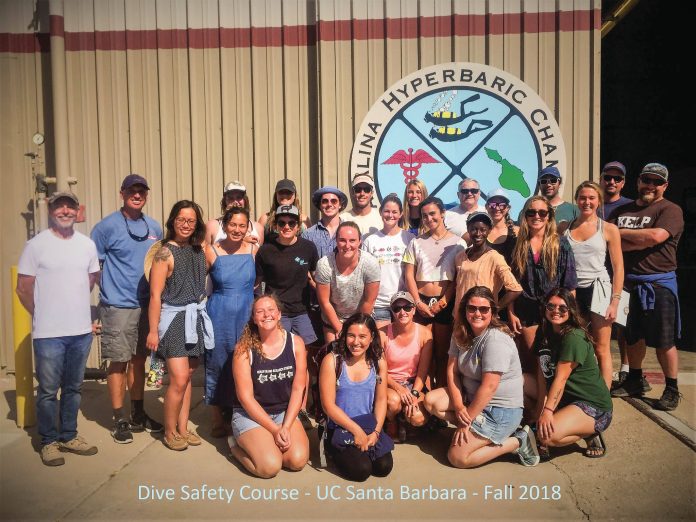Hannah Maerowitz
Science & Tech Editor
Although UCSB is well-known for its scenic surroundings, it is also proximate to some of the best diving sites in the country, which have contributed to its robust scientific diving program.
In 2017, 148 divers logged scientific dives. Another 37 new divers became scientific diving certified through UCSB’s scientific diving program, many of whom have described the program as life-changing.
“There have definitely been quarters where I spent more time underwater than I spent in class and I don’t regret it at all. It’s so worth it,” said Jordan Gallagher, who recently graduated from UCSB and will soon begin his masters program at UCSB’s Marine Science Institute.
Gallagher became scientific diving certified the summer after his freshman year at UCSB and estimates that he has logged around 350 dives since. Through the scientific diving program, he has conducted surveys of organisms and kelp at dive sites in Carpinteria, Gaviota, and the Channel Islands; traveled to French Polynesia to dive; and launched an independent research project that analyzes how marine reserves contribute to a symbiotic relationship between lobster populations and fisheries.
“The scientific diving program here is one of the major reasons I got an offer for graduate school right out of undergrad. There are so many opportunities through the program,” said Gallagher, who also serves as the Associated Students coastal fund chair.
Due to his passion for diving and a desire to engage more students in the program, Gallagher and the A.S. Coastal Fund Board have created a scholarship that allows one student every fall and spring quarter to complete the scientific diving certification program free of charge. According to Gallagher, two students have already been certified via this scholarship program.
“The costs can be a deterrent, but there are resources out there for people, particularly for people that are underrepresented in the field. And once you do it, there are so many opportunities out there. There are tons of [UCSB affiliated] labs that will let you dive for free and if you stay with them long enough, may hire you full time as a technician,” said Gallagher.
Gallagher is far from being the only one to benefit from the ample opportunities available to students in the scientific diving program.
“I have seen many students go on to enjoy successful, professional careers using their diving experience and credentials,” said Scott Simon, the director of Research Experience and Education Facility (REEF) at UCSB. Simon has seen some students go on to become aquarists for prestigious public aquariums including the Monterey Bay Aquarium, the Aquarium of the Pacific, and the California Science Center.
Other students have moved onto well-known research programs after graduation at organizations ranging from the Partnership for the Interdisciplinary Studies of Coastal Oceans (PISCO) to the National Oceanic and Atmospheric Administration (NOAA).
According to Simon, divers trained at UCSB are given opportunities to log dives all over the world, from the tropical waters of Mo’orea to the polar oceans of Antarctica. There are also opportunities to do freshwater diving in rivers and lakes.
To enter the program, students only need an open water certification (which can be acquired through the recreation center at UCSB), some prior diving experience, and an interest in working in a dive lab.
“Many students we train are very new to diving and a number have only dived in tropical waters for vacation/family trips,” said Simon.
One concern new divers may have is safety. However, UCSB’s diving program maintains a high level of safety, with zero serious dive safety incidents reported in 2017.
“The dive safety program here is amazing and very supportive. They want you to get the work done that you need to get done and also be safe,” said Katrina Munsterman, a second year graduate student at UCSB who works in the Burkepile Lab.
For students who want to seize some of the university’s underwater opportunities, applications for scientific dive certification in spring 2019 open on Nov. 1.

















